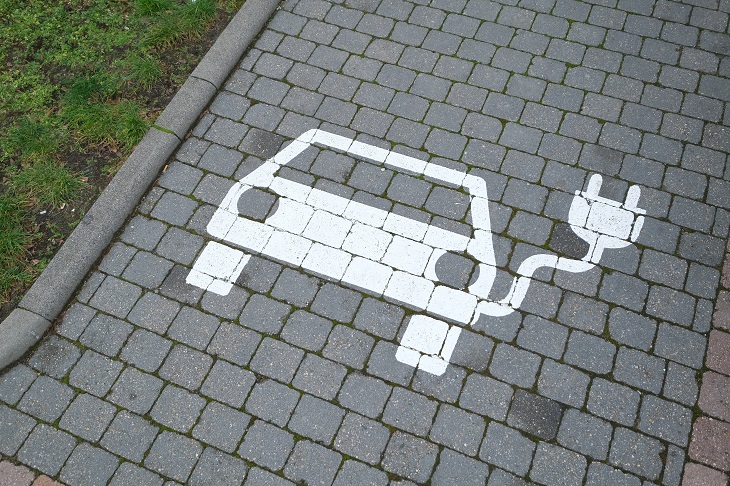Luxury Tesla sports cars are cool. Their instant acceleration that flings iPhones onto the backseat makes for great TV, especially when they’re zipping around the Top Gear racetrack under the [not-so-careful] handling of Jeremy Clarkson.
Lower-end ‘affordable’ European ecars are hilarious to watch as they struggle along motorways, limping toward non-existent recharging stations like ugly, half-squashed bugs.
In the early 2000s, it was a great (if not predictable) gag to take ecars on road trips and watch the tyranny of distance defeat them. Plenty of fossil-fuel-driving hopefuls who claim to desire an ecar of their own (without committing) snottily note, ‘We moved on from horses and carts – this is the next evolution!’ Sure, but at least if a horse breaks down you can eat it. Lifeless ecars quickly become expensive gym sessions.
‘This is the future of motoring here!’ shouted Clarkson, pushing a dead ecar by its door while James May heaved at the back.
It was inevitable that ecar manufacturers would eventually improve their range and expand charging infrastructure as the years passed. Mind you, even the keenest ecar countries are a long way from a genuine ‘transition’. There are engineering roadblocks that will always make ecars unattractive to anyone who has to pay for them with real money (governments and politicians don’t count).
Markets are pretty good at deciding what constitutes a shit or – if we’re going to be kind – unfinished product. People are not buying ecars without serious government subsidies because they are not as good as conventional cars. They don’t go as far or last as long, they cost too much, deteriorate on Australian gravel roads, have zero resistance to floods, take ages to recharge, randomly catch fire, change performance with temperature, and if they break – no one has a clue what to do.
They are also an investment with appalling resale potential. Ecars sit around leaking charge and degrading their batteries in the car park. A 2011 Nisson Leaf’s range drops to 80 per cent in 5 years. A 2017 Chevrolet Bolt warns that 10-40 per cent of battery capacity could be lost over the warranty period. Fast charging (or supercharging) is thought to add an additional 10 per cent drop in range for most ecars. Owners are faced with the prospect of either waiting hours for them to charge or making use of superchargers and copping the irreversible damage. You would never buy a second-hand ecar for the same reason most people aren’t adopting a ten-year-old iPhone.
Within the European Union, customers have to be bribed into taking on the financial risk of an ecar. As of 2020, between 20-17 countries offer significant incentives. Even with this push, they remain a minority purchase at 11 per cent. This huge public cost has caused even the Woke-ist countries like Germany to walk away from throwing money at the ecar industry.
‘We simply cannot afford misguided subsidies anymore. These cars have so far been subsidised over their lifetime with up to 20,000 euros, even for top earners. That is too much. We can save billions there, which we can use more sensibly,’ said German finance minister Christian Lindner.
Unsurprisingly, the Association of International Motor Vehicle Manufacturers was furious, calling it a ‘severe breach of trust’. Why? Aren’t they confident that the green virtue of their planet-saving ecars is enough of a draw card for customers?
Norway, one of the only nations with ecars making up a majority of new purchases, has also decided to end most incentives by 2023. Did you do your bit for the environment and buy an ecar? Congratulations. The government in Norway is now going to go ‘more green’ and shift away from private car ownership and instead encourage walking, cycling, and taking the bus. Feel that? It’s the tide of civilisation withdrawing.
There is an enormous ‘buyer-beware’ message sitting in plain sight.
Politicians looking to polish their green credentials stand in front of press conferences and insist that ecars are ‘cheaper!’ and ‘affordable!’ because they are heavily subsidised. But, as purchases grow, governments have to abandon tax perks, handouts, and ‘free parking’ offers which leaves ordinary consumers stuck trying to buy extremely expensive ecars that work about half as well as their old, cheap, fossil-fuel car – which the government has quietly banned to stop the market regurgitating the ecar mistake all over its deceitful ministers.
So yes, green groups will get their wish. Western nations will experience a sudden decrease in private car ownership because of poverty, not choice. You won’t see that on Albanese’s brochure regarding his ecar policy.
Albanese must think Australians are total mugs (perhaps they are, if they fall for this one).
Labor has a bill before Parliament to deepen the deficit by spending (who knows how many billions) on tax concessions for those who purchase new ecars. There’s a reason Australia has less than 2 per cent ecars – they are a terrible fit for the enormous distances that we travel. Of those 2 per cent, most are likely doing loops around Canberra while the rest are the third or fourth luxury vehicle of a virtue-signalling professional in a Teal seat. Not the actual Teal leaders, though. They drive hybrids – which is green virtue with a backup oil rig.
Treasurer Jim Chalmers bravely stated that ecars are, ‘Good for motorists, good for employers and their workers, and good for climate action.’
Notice he didn’t mention ‘good for the energy grid’ because if the predicted 3.8 million ecars fantasied about by the Powering Australia Plan come home and plug in, it’ll be back to the Dark Ages for the rest of us. He also left out the bit about ‘good for child slave labour in the Congo’ and ‘good for China’s barbaric rare earth mining’ and ‘good for the destruction of the ocean floor in the blue economy’. If Chalmers had been feeling especially honest, he might have added ‘good for supply chains with all those extra delays for charging added in’.
Labor’s policy is designed to benefit large corporations who wish to gift a bit of eco-virtue to their employees. If the government was actually interested in transforming the transport grid, they’d stop interfering. It is no accident that Tesla makes the best ecars. They were the one company forced into a situation of ruthless market competition which dramatically increased the quality of their product. Propping ecars up with public money allows them to languish in mediocrity and when the safety net is ripped away, the public will be left with an expensive, undesirable product.
There are a couple of huge lies sitting underneath the push for ecars – lies that will become obvious too late for the public to correct course.
The first is that Labor can power an ecar revolution. Labor is pushing Australia towards a sharp increase in energy requirement that will peak during the night. At the same time, it is closing fossil fuel power stations and putting all of its faith in solar and wind – a pair of power generation technologies that slump in the evening. There are only two ways that Labor can provide enough power to charge its millions of ecars – re-open coal-fired power stations or build nuclear plants. It has dismissed both of these options. Australia was already heading toward an energy catastrophe due to the ‘renewables empire’, ecars will accelerate this problem into a genuine nightmare for everyone.
The second is that ecars are convenient. There is no need to explain this one. Next time you pull into a packed petrol station with four or five cars in front and you’re frustrated that this is going to take 20 minutes! Remember that the fastest supercharger around (of which very few are installed) takes 15 minutes. You’re going to be there for over an hour and shorten the life of your battery.
Lie three is the claim that ecars are environmentally friendly. They are not. The pursuit of ecars is the primary driver behind deep sea rare earths mining – one of the most destructive and damaging mining activities there is. Other rare earths mining done on the surface produces astonishing amounts of radioactive sludge (which is why (environmentally conscious?) China took over their production. At the same time, rare metals like copper are mined in the third world by children. There’s a reason mining companies are ‘going green’ – this misguided obsession with Net Zero technologies has sparked a mining boom. Far from protecting the environment, we have never sought to dig more of it up than we are today.
By far the greatest lie is the promise of lithium. Renewable energy and ecars both contain lithium and act as competing industries for a vanishingly rare resource. The more ecars on the road, the more power is needed to charge them, which means we have to build more wind turbines, solar panels, and battery farms. It is an equation that gets out of control immediately when it comes to the sheer volume of mineral required to meet demand. It is a nonsense waste of a valuable resource that the rest of civilisation needs for phones, computers, and all manner of electrical system.
We are wasting lithium on power generation and ecars when other technologies exist – better technologies – and worse, we are using public money to force a transition that the market clearly doesn’t want.
This is not some kind of Climate Change wishy-washy apocalypse with a shifting end date, critical lithium shortages are expected by 2025, long before the Net Zero 2030 targets come into effect.
Car manufacturers admit that there is only enough lithium for 14 million ecars while the World Economic Forum says the world needs 5 billion to get to Net Zero.
The lithium shortage is about to make phones, computers, TVs, fridges, and all household electrical goods extremely expensive. If you think the cost of living is bad now, wait until the lithium dries up. Lithium used to cost $6,000 per tonne in 2020, in 2022 that figure sits at $78,032 per tonne. And what then? Solar panels, wind turbines, and battery farms have a best-case lifespan of 20 years. Everything that lithium was wasted on is headed for landfill leaving the power grid to be ripped up and replaced by – well – probably nuclear but it will cost more because of the lack of lithium.
As Stuart Crow, chair of Lake Resources, said: ‘There simply isn’t going to be enough lithium on the planet, regardless of who expands and who delivers, it won’t be there.’
It doesn’t help that China owns around 80 per cent of the lithium supply chain, so it can quite literally hold the world to ransom once the ecar and renewables transition has taken place.
Jeremy Clarkson’s original impression of ecars in the 90s was spot on. He’s gone a little green under the wing of Amazon, but in addition to being one of the greatest writers of his generation, he was also prescient.
In 1996, he warned us about the future of the environmental movement. What once read as comedic hyperbole sits as a chilling realisation that the green monster is out of control.
‘Idealists will never go away; they’ll just surface again with a new corporate identity. Now they’re back under the environmentalist banner. Only this time, in their quest to bring down commercialism and give power to the people, they really do seem to have hit a raw nerve. “If we carry on like this, the planet will die. In five minutes of geological time, we have turned paradise into a rubbish dump.” Horse shit. They’re not the slightest bit bothered about the environment; it’s just a weapon that allows them to attack a system that no idealist has ever accepted: democracy.
‘But they’ve had a huge effect. Fearful of creeping sympathy for the so-called Greens, stupid, short-sighted governments all over the world have imposed Draconian environmental laws on what they see as easy meat – the internal combustion engine.
‘…If the environmentalists ever realise their dreams, you can kiss goodbye to free thought and say hello to the Gestapo or the KGB or whatever they decide to call their secret police. In fact, environmentalism is every bit as dangerous as Communism or Fascism.’
Got something to add? Join the discussion and comment below.
Get 10 issues for just $10
Subscribe to The Spectator Australia today for the next 10 magazine issues, plus full online access, for just $10.


























Comments
Don't miss out
Join the conversation with other Spectator Australia readers. Subscribe to leave a comment.
SUBSCRIBEAlready a subscriber? Log in